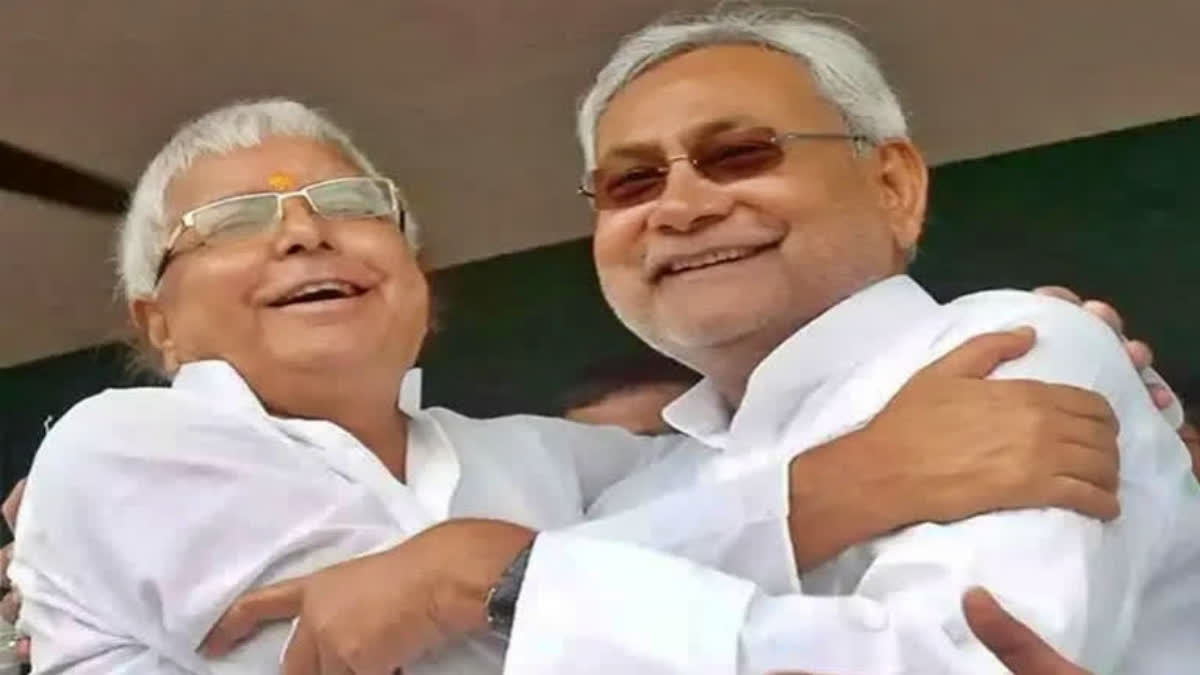New Delhi: The BJP is up for a tough fight in Bihar in the Lok Sabha elections slated next year and the JD(U) and the RJD may steal the show if they stay united under the newly-formed INDIA alliance, experts say.
“Earlier, the RJD and the JD(U) were not in alliance,” psephologist Sanjay Kumar told ETV Bharat. “But now, both the JD(U) and the RJD are in alliance under INDIA. If the alliance runs smoothly, it will give a tough fight to the BJP," he said.
Bihar Chief Minister Nitish Kumar dumped the BJP as an alliance partner last year and tied his party up with its major rival in the state, RJD. He also made RJD leader Lalu Prasad Yadav’s son Tejashwi Yadav the Deputy Chief Minister.
In the 2019 General Elections, the NDA won 39 of the 40 Lok Sabha seats in Bihar. While the JD(U) as an alliance partner of the NDA, won 16 of the 17 seats it was given, the BJP won all the 17 seats it contested. The third alliance partner, the Lok Janshakti Party (LJP) under Late Ram Vilas Paswan, also won all the six seats it contested.
The INDIA alliance, an initiative of Nitish Kumar, is now working on a strategy of ‘One Constituency One Candidate’ for the Lok Sabha elections next year. In other words, parties under the INDIA alliance will put up only one consensus candidate against an NDA candidate in every seat.
This brings up the issue of seat-sharing between the parties of the INDIA alliance. According to Sanjay Kumar, this should not be a problem between the JD(U) and the RJD in Bihar as both are big parties in the state.
“The problem will be with the smaller parties. The Congress is small in Bihar but big nationally. Obviously. It might seek more seats,” Sanjay Kumar said. But what is crucial in elections in Bihar is the caste equations. The RJD has a 14 per cent Yadav and 16 per cent Muslim support base. With a 30 per cent support base, it can make a winning combination.
Before last year’s alliance with the RJD, the JD(U) had taken the support of the upper castes during the 2020 assembly elections in Bihar. The upper castes, including the Brahmins, Bhumihars, Rajputs and Kayasthas, comprise 21 per cent of the voter base. These also include the Khatris of Punjabi origin and the Sindhis, considered as migrants, who comprise 1 per cent of the upper caste vote base.
However, political analyst Prem Kumar told ETV Bharat that it is wrong to say that the JD(U) is banking only on the upper caste vote bank. “Most of the upper caste vote bank is with the BJP,” he explained. “The JD(U) vote bank is mainly in the OBC class only. It comprises Kushwaha, Lavkush and Kurmi. They comprise 6-7 per cent of the core base.”
At the same time, Prem Kumar said that any party that has the support of the Muslims in Bihar has a strong influence. “Both the JD(U) and the RJD have strong Muslim voter bases,” he said. “When these two parties come together, they become very strong.”
The 2015 general assembly elections in Bihar are a case in point in this context. That year, the RJD-JD(U) combine routed the BJP comprehensively. Given the newly-formed INDIA alliance, what can the BJP’s strategy be? According to reports, the BJP, during its core committee meeting last month, has decided to contest 30 of the 40 Lok Sabha seats in Bihar next year. It will give seats six seats to both factions of the LJP led by Lok Sabha Member Chirag Paswan and his uncle Pashupati Kumar Paras.
Two seats of the NDA are expected to be given to Upendra Kushwaha’s Rashtriya Lok Samata Party (RLSP). Another seat may be given to Hindustani Awam Morcha (HAM) of former Bihar Chief Minister Jitan Ram Manjhi. Last month, Manjhi’s son resigned from Nitish Kumar’s Bihar cabinet and his father Jitendra Manjhi then met Home Minister Amit Shah. According to observers, the BJP is trying to divide Nitish Kumar’s support base of non-Yadav backward castes and some Dalit communities.
“(Ram Vilas) Paswan has already done that,” said Prem Kumar. “He has divided the Dalits into Mahadalits and Dalits. In fact, Chirag Paswan had put up his party’s candidates in each seat where Nitish Kumar’s JD-U contested (in the 2020 assembly elections).”
Earlier this month, when the INDIA alliance of the opposition parties was formed in Bengaluru, the BJP had simultaneously called a meeting of its allies in New Delhi during which it tried to bring together Chirag Paswan and his estranged uncle Pashupati Kumar Paras.
Chirag touched his uncle’s feet and the latter hugged him. But differences remain. The bone of contention is the Hajipur seat, which was the bastion of Ram Vilas Paswan, While Chirag has staked claim for all the six Lok Sabha seats that the undivided LJP had won last time, his uncle refuses to give up the Hajipur seat, which he had won last time. So, even as the BJP engages in its strategy of reconciliation and bringing on board underprivileged communities, including Dalits, it is staring at a bigger challenge of facing a united JD(U) and RJD in Bihar in the Lok Sabha elections next year.



